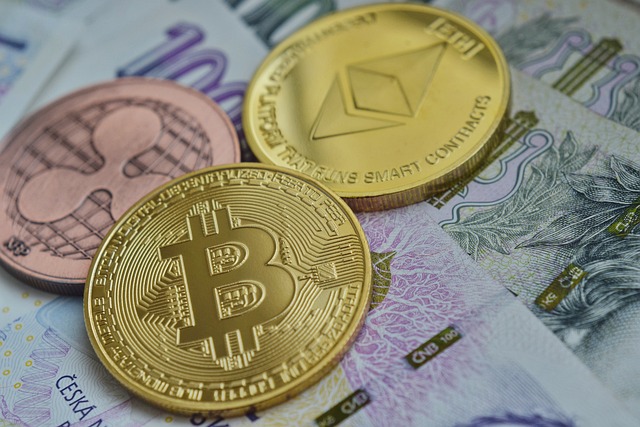When Can You Trade Crypto? A Comprehensive Look at Timing in the Cryptocurrency Market
Author: Jameson Richman Expert
Published On: 2024-10-14
Prepared by Jameson Richman and our team of experts with over a decade of experience in cryptocurrency and digital asset analysis. Learn more about us.
The cryptocurrency market has become an intriguing frontier for both seasoned investors and newcomers alike. As digital currencies continue to gain traction, the question arises: When can you trade crypto? Understanding the best times to engage in trading activities can be critical to maximizing profits and minimizing losses in this volatile market. In this article, we will explore various factors that influence trading schedules, including market hours, trading strategies, and technological advancements, among others. Along the way, we'll also offer insights into tools and resources that can enhance your trading experience.

Understanding the Cryptocurrency Market Schedule
Unlike traditional stock markets, which operate on fixed hours during weekdays, the cryptocurrency market is open 24/7. This constant availability allows traders to buy and sell assets at their convenience but also presents unique challenges.
24/7 Trading: Pros and Cons
- Pros: Flexibility to trade at any hour, accommodating various time zones and personal schedules.
- Cons: The risk of emotional trading due to the constant availability of market movements can often lead to impulsive decisions.
For example, during weekends, trading volumes may decrease significantly, leading to heightened volatility. Hence, traders must remain cautious during such times to avoid unexpected price swings.
Institutional vs. Retail Trading Hours
In addition to the general trading hours, institutional trading strategies may differ from those of retail traders, leading to varied significantly within the market. Understanding this discrepancy can be beneficial.
Institutional Traders
Institutional traders typically engage heavily during weekdays when trading volume is at its peak. They employ advanced algorithms and strategies that can generate returns even in less favorable situations. This leads to more stable price movements during these hours.
Retail Traders
On the other hand, retail traders often choose to trade during evenings or weekends. While they have the flexibility to engage whenever they wish, they may also face increased price volatility during these hours, as liquidity is typically lower.
Factors Influencing Crypto Trading Times
The decision of when to trade crypto can be influenced by a variety of factors, including market sentiment, news events, and trading strategies. Understanding these factors can help traders position themselves effectively in the market.
Market Sentiment
Market sentiment refers to the overall attitude of traders toward a particular cryptocurrency or the market as a whole. It's essential to monitor social media, forums, and news websites to gauge sentiment, as it can greatly affect trading activity. Positive news can propel trading volumes during specific times, while negative news can cause panic selling.
News Events
News events can impact the market in real-time. Major announcements—such as regulatory changes or industry developments—often create specific trading windows. Traders should stay alert to upcoming events that could influence market behavior.
Examples of Impactful News Events
- Regulatory announcements by governments.
- Partnerships between major companies and cryptocurrency projects.
- Technological advancements or major updates within blockchain networks.

Trading Strategies to Optimize Timing
Various trading strategies can help traders capitalize on market opportunities, taking into account when they can trade crypto effectively.
Day Trading
Day trading involves opening and closing positions within the same trading day. This strategy is often employed during higher volatility hours, commonly observed during weekday trading when institutional activity peaks. Traders relying on this method must be diligent in monitoring their charts and staying engaged throughout the day.
Swing Trading
Swing traders, on the other hand, look to capitalize on price "swings" over several days or weeks. This approach allows for more flexibility, as traders can analyze market performance and make informed decisions outside of peak trading hours.
When to Swing Trade
- Ideal during less volatile hours or weekends when market direction solidifies.
- Can leverage more extended time frames to smooth out erratic price movements.
Cutting-Edge Tools and Resources for Crypto Trading
To enhance your trading experience, several tools and resources can provide valuable insights into market behavior.
Utilizing Technical Analysis
Technical analysis (TA) is the study of historical price patterns and trading volumes to forecast future price movements. Understanding key indicators such as moving averages, Relative Strength Index (RSI), and Fibonacci retracement levels can aid in making informed trading decisions.
Signals and Bots
Signals and automated trading bots are becoming increasingly popular among traders. These tools help automate trading strategies, alerting traders to potential entry and exit points. Resources such as How to Trade Crypto Without KYC: A Comprehensive Guide delve deeper into trading without identity verification, highlighting options that enhance privacy while trading crypto.
Additionally, Decoding Crypto Signals: A Comprehensive Guide to Navigating the Cryptocurrency Market provides insights into understanding and utilizing crypto signals effectively, allowing traders to leverage the wisdom of the crowd when determining when to trade.
Crypto Exchanges and Trading Platforms
Choosing the right exchange is vital for a seamless trading experience. Factors to consider include fees, trading pairs, liquidity, and customer service. For instance, a comprehensive resource like Crypto.com Trade Crypto: Navigating the Landscape in 2024 will help you understand emerging platforms and their features for 2024.
Exploring the Future of Crypto Trading
As technology evolves, so does the landscape of cryptocurrency trading. Advancements like artificial intelligence and machine learning are revolutionizing trading strategies.
Auto Bots in Cryptocurrency Trading
Exploring automated trading solutions has become essential. Resources like Exploring the World of Auto Bots in Cryptocurrency Trading detail how bots can manage trades based on algorithms, freeing traders from constant monitoring and allowing them to make calculated decisions while they focus on other endeavors.
The Rise of Bot Traders
The role of bots is expanding rapidly, impacting traditional financial markets. The article titled The Rise of Bot Traders: Revolutionizing Financial Markets explains how retail traders can capitalize on these tools, leveraging data analysis and high-frequency trading capabilities that were once only accessible to institutional investors.

Conclusion: Making Informed Decisions on When to Trade Crypto
Trading cryptocurrency can be both rewarding and challenging. To navigate this complex landscape effectively, traders must consider various factors that influence market timing. From understanding institutional versus retail trading hours to leveraging advanced tools, the key lies in making informed decisions.
As the market continues to evolve, keeping abreast of the latest news and technologies will serve to enhance your trading acumen. The choice of when and how to trade is ultimately yours, and optimizing your strategy can unlock the potential for success in this ever-changing market.
In my opinion, the future of crypto trading is bright, particularly with the rapid integration of AI and trading bots. However, maintaining a cautious yet proactive approach will be essential in navigating the potential risks involved.